 The Oct. 23, 2012 Third Party Presidential Debate between four candidates vying, along with President Obama and Mitt Romney, for the office of the U.S. Presidency, provided a rare, yet valuable glimpse at what a genuine, representative American democracy might look like. The worthy discussion, at the very least, should be read via text transcript, exclusively available here at The BRAD BLOG, for those who lack the time to watch the ninety minute video, embedded below.
The Oct. 23, 2012 Third Party Presidential Debate between four candidates vying, along with President Obama and Mitt Romney, for the office of the U.S. Presidency, provided a rare, yet valuable glimpse at what a genuine, representative American democracy might look like. The worthy discussion, at the very least, should be read via text transcript, exclusively available here at The BRAD BLOG, for those who lack the time to watch the ninety minute video, embedded below.
Unlike Democracy Now's three expanded debates, which presented third party candidate responses to the questions posed at the three "official" Presidential debates and one Vice-Presidential debate sponsored by the so-called Commission on Presidential Debates, the Oct. 23 debate provided a forum that was not tethered to what co-moderator Christina Tobin of the Free and Equal Foundation, the organizers, described as "the private interests who control our beliefs, our opinions and our lives." Here, questions were neither posed directly by, nor filtered through corporate media-controlled moderators. Rather, they were presented, word-for-word, as submitted by citizens through social media.
With the single exception of the failure of Libertarian Candidate and former New Mexico Republican Governor Gary Johnson to say where he stood on "top-two" primaries (aka "Cajun primaries"), it was a debate in which all candidates left no room for doubt as to where they stood. It was a debate that included in-depth discussion on a wide variety of issues of vital importance, many of which were understandably evaded not only by the two major party Presidential candidates, but by the corporate media in the official debates, because those issues conflict with corporate wealth and power, including the wealth of the corporate-owned media.
It was a debate that began with Tobin's promise of future debates between "more candidates at every level of government" and ended with her surprise announcement of a final, foreign policy debate, next Tuesday, Oct. 30, commencing at 9:00 p.m. ET, broadcast via RT America, between two of the four candidates to be selected via an [ugh] online, instant run-off vote...
Refreshing snafu
It is perhaps a hallmark of the official two-party debates that they are tightly scripted, with a corporate media moderator tethered to handlers via an earpiece.
Here, moderator Larry King, sans earpiece, announced that "each candidate will have the opportunity to make a two-minute opening statement." He then began with the first question.
The debate proceeded through responses to that first question, rebuttals and a second question before Johnson asked, "How 'bout opening statements?"
No doubt, the "professional" producers of a corporate media-controlled debate would have been horrified by such a snafu. This writer found such an error, flowing from the spontaneity of the event, refreshing.
Wide range of candidates and discourse
For the most part, the debate entailed honestly stated positions, often delivered with passion, by the four third party Presidential candidates. Two of those candidates, the Justice Party's Rocky Anderson and the Green Party's Jill Stein are progressives. Johnson is a Ron Paul-like Libertarian, and the Constitution Party's Virgil Goode, Jr., for the most part, holds views shared by many past conservatives --- views that bore none of the deceptions which provide the hallmark of the corporate-controlled, radical right which now controls the levers of power within the Republican Party.
The debate questions focused on six categories: "Top-two" primaries; the War on Drugs; military spending/foreign policy; education and student debt; civil liberties and what each candidate sees as the ideal amendment to the U.S. Constitution.
'Top-two' primaries
The 'top-two' primary system began in Louisiana during the one party (Democratic) control in the Jim Crow era. Recently it was adopted in CA and WA. It will be on the Nov. 6 ballot in AZ.
Both Goode and Anderson concurred in Stein's assessment that the "top-two" system, which permits candidates to attach any label they desire to their names, which appear on a crowded ballot, serves to confuse voters, degrade and obscure the meaning of parties, and enhance the ability of "whoever has the biggest budget...to win that primary."
Anderson added, correctly, that the system would produce a general election in which the top-two represent a single party --- a point that was stressed by The BRAD BLOG in advance of last June's CA-26 U.S. Congressional primary where long-time Republican Ventura County Supervisor Linda Parks ran as an independent against Tea Party Republican Tony Strickland and four Democrats in a district where the majority of voters were registered Democrats.
Both Goode and Johnson, who failed to state where he stood on the "top-two" primary, took the position that this was an issue for the states to decide. Anderson countered that, since it includes candidates for federal office, it is a federal issue.
War on Drugs
As reflected by our three part special series earlier this year, the folly of drug prohibition (aka 'the War on Drugs') is a topic that should be at the center of our nation's discourse.
In PART 1 of that series, we examined the question of whether the U.S. Government's effort to challenge legalization of marijuana in California and elsewhere was akin to "shutting down the competition", given the CIA's long-documented history of profiting from the world-wide drug trade. In PART 2 we posited that an end to the 'War on Drugs' could deliver a devastating blow to the bottom line of American corporations who have come to depend upon the Prison Industrial Complex in the U.S. and its huge pool of slave laborers --- most, non-violent drug offenders. In PART 3 we not only addressed the Frankenstein's monster we created, pointing to how the carnage wrought by organized crime south of the border was spilling into the U.S., but the extent to which the Drug War facilitates the domination of the 99% by the "one percent".
While the live debate format, obviously, does not allow for the depth of our three-part article, Anderson, Stein and Johnson touched upon a number of those issues in expressing vigorous opposition to the War on Drugs, in general, and in supporting legalization of marijuana and hemp. Differences in emphasis reflected, somewhat, a difference in background and political philosophy.
Anderson said that "less than 40,000 people were in prison on drug charges in 1971." Adding that, today...
With a background in law, Anderson illustrated the injustice in the 55-year mandatory federal prison sentence to a young man who was convicted of three separate sales of marijuana because the informant claimed that a gun was present. As President, Anderson would issue a pardon of all individuals serving time in federal prisons for drug-related offenses, unless they also committed other crimes.
Johnson, the Libertarian, openly admitted that he had used both marijuana and alcohol in the past. He stressed the hypocrisy, given that 50% of students graduating high school have used marijuana, and he stressed costs:
Stein, as a physician, stressed the science. "Marijuana," she said, "is a substance that is dangerous because it is illegal." The danger, she argued, is posed by "the illegal drug trade associated with marijuana prohibition."
Goode, who favors a reduction on the monies spent on the War on Drugs solely as part of the austerity measures he would adopt to balance the budget, refreshingly acknowledged that his position would not be popular with those in the audience. He is opposed to legalization of marijuana.
Military spending and foreign policy
As had previously been demonstrated by Representatives Dennis Kucinich (D-OH) and Ron Paul (R-TX), while they differ markedly on their respective philosophies on the core function of government, issues of foreign policy and military spending present an instance in which their views are tightly aligned.
Despite subtle differences in emphasis secondary to their diverse background, Johnson, Anderson and Stein all favor massive cuts in military spending, an immediate end to "military interventions" and drone strikes, which they saw as a source of blow back that, in Johnson's words, created "millions of enemies to this country that...would not otherwise exist." He advocated cutting back on our "military footprint worldwide" by eliminating many of the bases we maintain in Europe, Japan and South Korea.
Anderson, who referenced President Dwight D. Eisenhower's 1961 Farewell Address, described the corrupt symbiotic relationship between Congress and the military-industrial complex as "treasonous." Citing relevant treaties, Anderson described the invasion of Iraq as an illegal "war of aggression." He excoriated Congress for delegating its war powers to an imperial executive branch.
Stein, who shared Anderson's and Johnson's views, called for an international treaty that would eliminate the use of drones, either as an instrument of war or as a tool for governments to spy on their own citizens. She called for a foreign policy grounded upon international law, human rights and "global climate change, which should be the war that we are all fighting."
Goode favored reductions in military spending for essentially the same reasons he supports reduction of spending on the War on Drugs --- budgetary constraints.
Civil liberties
All four candidates spoke out in opposition to section 1021 the National Defense Authorization Act of 2012 (NDAA) which purports to permit indefinite detention of U.S. citizens on nothing more than a "suspicion of providing substantial support" for certain terrorist groups --- a section that has been challenged as being contrary to the right to due process guaranteed by the 5th and 14th Amendments to the U.S. Constitution.
Stein described the inclusion of a Presidential power to carry out assassinations overseas in 2001's Authorization to Use Military Force Act, the USA PATRIOT Act, the 2008 amendment to the Foreign Intelligence Surveillance Act (FISA) "retroactively legalized unwarranted wiretapping against U.S. citizen," and the provisions of the NDAA which purport to permit a President to "put us in prison at his pleasure without charge and without trial". She argued these unchecked Executive powers are a threat "against the very foundation of American liberty."
Citing his background in law, Anderson described what has taken place under the Bush and Obama administrations as "subversive and un-American," especially the NDAA which he described as the most "anti-American Act in our history" --- one that, by permitting a President to "indefinitely detain people without charges, without a trial, without legal assistance, and without the right of habeas corpus" thereby providing "one person [to] determine against whom and under what conditions laws passed by Congress and our Constitution will be applied" constitutes "the very definition of tyranny."
"We are on the road towards totalitarianism," Anderson ominously warned.
Just as The BRAD BLOG, citing Prof. Jonathan Turley, did back in 2009, Anderson lashed out at the sophistries that President Obama utilized to evade his Constitutional obligation to see that the laws are faithfully executed via prosecutions of high level Bush Administration officials who engaged in torture.
Economy, education and role of government
There was a fundamental divide between the two progressive candidates and the two right-leaning candidates as it pertained to whether government should meet a core function, recognized by the preamble to the U.S. Constitution, to "promote the general welfare." It is a divide that flows from what The BRAD BLOG previously described as "libertarian blind spots" engendered because libertarians' exclusively focus on governmental threats to liberty while they ignore the omnipotent power of private corporations; by an exclusive focus on individual liberty sans civic responsibility that is destructive of community, an equitable economy and a sustainable environment. The BRAD BLOG criticized the fact that libertarians focus almost exclusively on "market fundamentalism" as a form of political tunnel vision that ignores the basic obligations we owe to one another and to our planet whose ecological balance is vital to the very survival of our species.
"The biggest threat to our national security," Johnson proclaimed, "is the fact that we are going bankrupt" --- an assertion that drew "Four Pinocchios" from fact-checkers at the Washington Post, who described it as "a common scare tactic for budget hawks."
Where Mitt Romney's approach to budget deficits starts with an illogical, $5 trillion tax cut that would mostly benefit the top two percent, Johnson offers up a radical elimination of both individual and corporate income tax, the IRS and its replacement by a "use tax."
Given the breadth of issues covered in the four-candidate debate, the progressive candidates did not pin down Johnson on whether he shares the view of his party that the the role of government is "limited to protecting individuals for coercion and violence." However, the few specifics that were covered --- healthcare and education --- suggest as much.
In "Single-Payer and the 'Democracy Deficit'", we described the current privatized healthcare system as corrupt, dysfunctional and deadly, laid out the drastic reductions in cost experienced by single-payer systems which treat healthcare as a fundamental right and which are available in every industrialized nation, except the U.S. We also addressed the deficiencies of what would become the Affordable Care Act in "ObamaCare: Right Diagnosis, Wrong Prescription".
Anderson observed that "infant mortality rates in the United States are next to the worst in the industrialized world"; that the U.S. "has the worst rate of women dying in connection with pregnancy and childbirth," and that "under Obamacare, there will be 30 million people without essential healthcare by the year 2022."
But where Anderson and Stein saw the solution in a single-payer, Medicare-for-All system, Johnson hinted at eliminating Medicare altogether because he saw it as "economically unsustainable" --- a contention that would no doubt come as a surprise to the U.K. where a very successful national healthcare system has been in place since 1947.
Fellow budget hawk, Virgil Goode, piled on with proposals to eliminate Pell Grants, Planned Parenthood and National Public Radio.
Johnson, the first in line to answer a question about the spiraling cost of a college education (estimated to reach $400,000 by 2030) offered up a free-market solution. Students should simply refuse to attend college until colleges lower tuition. He did not suggest what those students could do with their lives while they quietly waited for the assistance of the invisible hand.
Stein, who in a previous Democracy Now! "extended debate" took aim at the use of banks as middle men which have created massive student debt via Pell Grants, raised concerns that we have created a generation of indentured servants through student loans.
Anderson observed that student debt had now exceeded $1 trillion and that Congress, in service of "their fat cat contributors" had "made non-dischargeable [sic.] in bankruptcy. You can go charge a Maserati on your credit card and write that off in bankruptcy," he added, "but somebody that went out and did what they could to get a decent education can’t get a new start."
Anderson proposed restoring a student's right to discharge a loan in bankruptcy. Stein argued that instead of bank bailouts, we should bail out students.
Both Stein and Anderson call for extending a free public education beyond high school to include college and trade schools. Johnson argued that "free comes at a cost" and that we simply can't afford it. Anderson countered that public education is an investment; that it pays off in spades, and that investment in education of our workforce was critical to U.S. success in a global economy.
Constitutional Amendment
Candidates where asked what amendment to the U.S. Constitution they would offer if they knew it would pass.
Anderson proposed an equal rights amendment that would proscribe discrimination on the basis of gender or sexual orientation. Stein proposed the amendment already proposed by Vermont which would establish that corporations are not people and money is not free speech.
Goode and Anderson proposed Congressional term limits. Stein countered that term limits do not prevent corporations from "buying our candidates" --- something that has proven to be the case in states like California, where corporate influence has continued, despite term limits on state legislative offices.
The complete video of the 10/23/2012 "Third Party Presidential Debate" follows. The complete text transcript is posted here.


 No Way Home: Trump's Iran War a Spreading, Chaotic, Deadly, Disaster: 'BradCast' 3/3/26
No Way Home: Trump's Iran War a Spreading, Chaotic, Deadly, Disaster: 'BradCast' 3/3/26 'Green News Report' 3/3/26
'Green News Report' 3/3/26
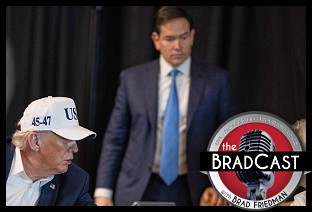 Trump Attacks Iran in 'Operation Epstein Fury': 'BradCast' 3/2/26
Trump Attacks Iran in 'Operation Epstein Fury': 'BradCast' 3/2/26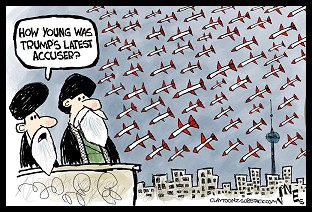 Sunday 'No, More Wars!' Toons
Sunday 'No, More Wars!' Toons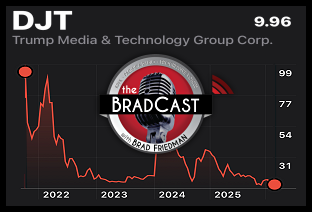 Loser Trump's Unlawful Tariffs, Failed Media Company, Corrupt SCOTUS: 'BradCast' 2/26/26
Loser Trump's Unlawful Tariffs, Failed Media Company, Corrupt SCOTUS: 'BradCast' 2/26/26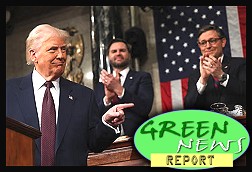 'Green News Report' 2/26/26
'Green News Report' 2/26/26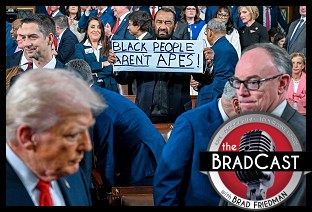 The State of the Union is ... Insane.
The State of the Union is ... Insane.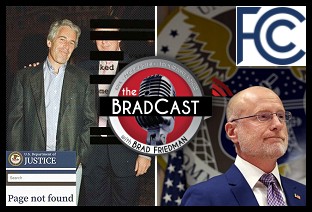 FCC's New 'Threat' to Broadcasters; NPR Confirms DOJ's 'Missing' Trump 'Rape' Docs: 'BradCast' 2/24/26
FCC's New 'Threat' to Broadcasters; NPR Confirms DOJ's 'Missing' Trump 'Rape' Docs: 'BradCast' 2/24/26 'Green News Report' 2/24/26
'Green News Report' 2/24/26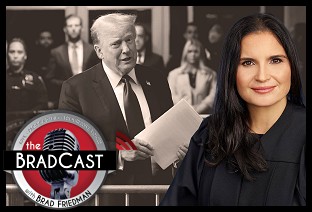 Aileen Cannon May be Covering Up Evidence of Trump Rape: 'BradCast' 2/23/26
Aileen Cannon May be Covering Up Evidence of Trump Rape: 'BradCast' 2/23/26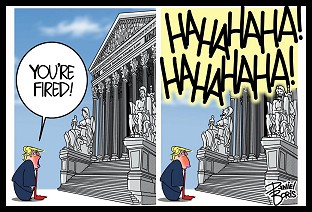 Sunday 'Plan B' Toons
Sunday 'Plan B' Toons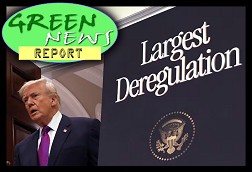 'Green News Report' 2/19/26
'Green News Report' 2/19/26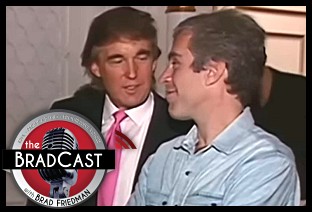 DOJ Hiding Evidence of Trump Rape, Assault Allegations: 'BradCast' 2/19/26
DOJ Hiding Evidence of Trump Rape, Assault Allegations: 'BradCast' 2/19/26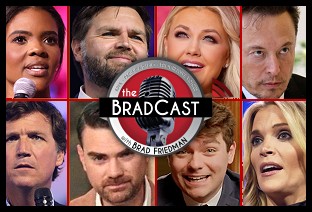 'No More Fig Leaves': Antisemitism Rising Inside MAGA, GOP: 'BradCast' 2/18/26
'No More Fig Leaves': Antisemitism Rising Inside MAGA, GOP: 'BradCast' 2/18/26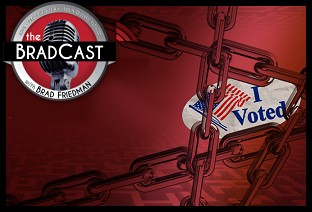 'SAVE America Act' Designed to Save GOP, Undermine Democracy: 'BradCast' 2/17/26
'SAVE America Act' Designed to Save GOP, Undermine Democracy: 'BradCast' 2/17/26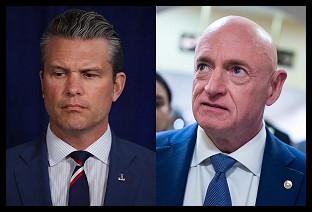 Court Blocks Hegseth Censure of Sen. Kelly
Court Blocks Hegseth Censure of Sen. Kelly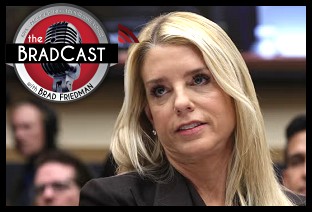 Harpy Tantrums, Legal Losses, Election Fails, Retreating ICE: 'BradCast' 2/12/26
Harpy Tantrums, Legal Losses, Election Fails, Retreating ICE: 'BradCast' 2/12/26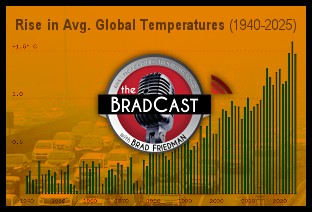 Trump to Reverse EPA's Landmark 'Endanger-ment Finding': 'BradCast' 2/11/26
Trump to Reverse EPA's Landmark 'Endanger-ment Finding': 'BradCast' 2/11/26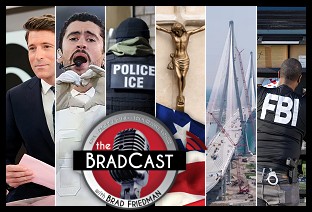 Trump's Racism, Corruption, 'Culture War': 'BradCast' 2/10/26
Trump's Racism, Corruption, 'Culture War': 'BradCast' 2/10/26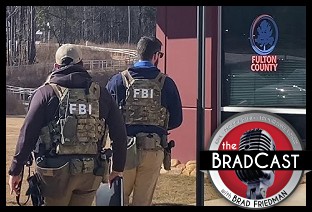 About Trump's FBI Raid of Fulton County, GA Election Hub: 'BradCast' 2/9/26
About Trump's FBI Raid of Fulton County, GA Election Hub: 'BradCast' 2/9/26
 VA GOP VOTER REG FRAUDSTER OFF HOOK
VA GOP VOTER REG FRAUDSTER OFF HOOK Criminal GOP Voter Registration Fraud Probe Expanding in VA
Criminal GOP Voter Registration Fraud Probe Expanding in VA DOJ PROBE SOUGHT AFTER VA ARREST
DOJ PROBE SOUGHT AFTER VA ARREST Arrest in VA: GOP Voter Reg Scandal Widens
Arrest in VA: GOP Voter Reg Scandal Widens ALL TOGETHER: ROVE, SPROUL, KOCHS, RNC
ALL TOGETHER: ROVE, SPROUL, KOCHS, RNC LATimes: RNC's 'Fired' Sproul Working for Repubs in 'as Many as 30 States'
LATimes: RNC's 'Fired' Sproul Working for Repubs in 'as Many as 30 States' 'Fired' Sproul Group 'Cloned', Still Working for Republicans in At Least 10 States
'Fired' Sproul Group 'Cloned', Still Working for Republicans in At Least 10 States FINALLY: FOX ON GOP REG FRAUD SCANDAL
FINALLY: FOX ON GOP REG FRAUD SCANDAL COLORADO FOLLOWS FLORIDA WITH GOP CRIMINAL INVESTIGATION
COLORADO FOLLOWS FLORIDA WITH GOP CRIMINAL INVESTIGATION CRIMINAL PROBE LAUNCHED INTO GOP VOTER REGISTRATION FRAUD SCANDAL IN FL
CRIMINAL PROBE LAUNCHED INTO GOP VOTER REGISTRATION FRAUD SCANDAL IN FL Brad Breaks PA Photo ID & GOP Registration Fraud Scandal News on Hartmann TV
Brad Breaks PA Photo ID & GOP Registration Fraud Scandal News on Hartmann TV  CAUGHT ON TAPE: COORDINATED NATIONWIDE GOP VOTER REG SCAM
CAUGHT ON TAPE: COORDINATED NATIONWIDE GOP VOTER REG SCAM CRIMINAL ELECTION FRAUD COMPLAINT FILED AGAINST GOP 'FRAUD' FIRM
CRIMINAL ELECTION FRAUD COMPLAINT FILED AGAINST GOP 'FRAUD' FIRM RICK SCOTT GETS ROLLED IN GOP REGISTRATION FRAUD SCANDAL
RICK SCOTT GETS ROLLED IN GOP REGISTRATION FRAUD SCANDAL VIDEO: Brad Breaks GOP Reg Fraud Scandal on Hartmann TV
VIDEO: Brad Breaks GOP Reg Fraud Scandal on Hartmann TV RNC FIRES NATIONAL VOTER REGISTRATION FIRM FOR FRAUD
RNC FIRES NATIONAL VOTER REGISTRATION FIRM FOR FRAUD EXCLUSIVE: Intvw w/ FL Official Who First Discovered GOP Reg Fraud
EXCLUSIVE: Intvw w/ FL Official Who First Discovered GOP Reg Fraud GOP REGISTRATION FRAUD FOUND IN FL
GOP REGISTRATION FRAUD FOUND IN FL

































